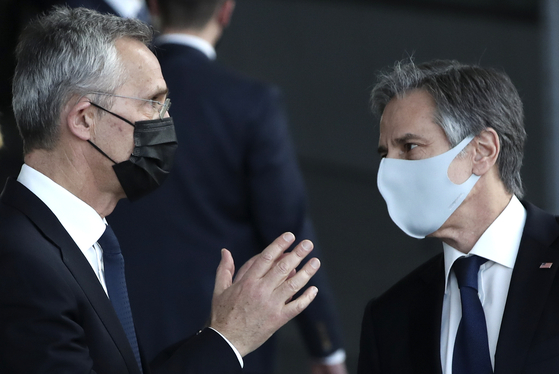![US Secretary of State Tony Blincoln visited Brussels, Belgium on the 23rd to meet NATO Secretary General Jen Stollenberg. [AP=연합뉴스]](https://i0.wp.com/pds.joins.com/news/component/htmlphoto_mmdata/202103/24/cd5e77eb-3a5e-464a-a004-4898d4ebb4d3.jpg?w=560&ssl=1)
US Secretary of State Tony Blincoln visited Brussels, Belgium on the 23rd to meet NATO Secretary General Jen Stollenberg. [AP=연합뉴스]
US Secretary of State Tony Blincoln flew to Europe to initiate the restoration of the traditional Atlantic alliance. After seeking Asian allies, South Korea and Japan, they urged them to join the’anti-China front’ and competed for’unity’ through high-level talks with China.
On the 23rd, Blincoln attends NATO Foreign Ministers’ Meeting
NATO President “Able to respond to China and Russia together”
On the 25th, Biden attends the EU summit video
Minister Blincoln visited Brussels, Belgium on the 23rd (local time) to attend a meeting of the Foreign Ministers of the North Atlantic Treaty Organization (NATO). At this meeting, he emphasized the’reconstruction of the alliance’ between the United States and NATO and discussed various issues such as the response to China. This is the first time I have visited Europe since Blincoln took office.
After visiting Korea and Japan last week and holding high-level talks with China in Alaska, the immediate visit to Europe is interpreted as a pavement to solidify the “anti-China-anti-Russian Scrum” by improving the “transatlantic relations” wished by the former administration of Donald Trump.
The U.S. State Department announced in a press release today that Secretary Blincoln met with NATO Secretary General Jens Stoltenberg and reaffirmed the U.S. commitment to the NATO alliance. The State Department said, “The two sides discussed the importance of continuing consultations on Afghanistan, concerns about harmful actions and misinformation attempts by Russia and China, disarmament, and regional security issues.”
“As long as we work together, we will be able to cope with both the rising China and the aggressive Russia,” he said at this meeting. “That’s why NATO is there.” “We will bring NATO to focus on the challenges China poses to a normative international order,” Blincoln said.
The day before, in line with Minister Blincoln’s visit to Europe, the EU, the United Kingdom, and Canada, together with the United States, raised sanctions against the human rights of minority ethnic groups in China. It can be seen, the European version of Politico said.
Initially, some European countries, such as France and Germany, were lukewarm about the concept of a democratic alliance against China. It was because of concerns that it could have a negative impact on economic cooperation with China. However, the atmosphere is changing as’human rights’, which cannot be ignored by the EU, has become a hot topic.
In particular, as China imposed counter sanctions against the EU’s imposition of sanctions, the conflict is intensifying. The EU imposed relatively light sanctions on four Chinese officials, and in retaliation, China countered a far greater number of European diplomats, parliamentarians, and scholars with counter sanctions.
Infuriated by this, European Parliament members declared that they would not ratify the EU-China investment agreement, and France, Germany, the Netherlands, Belgium, Italy and Denmark summoned the Chinese ambassadors.
Minister Blincoln also met with foreign ministers of Britain, France, Germany and Italy in Brussels. It is expected that a joint response to the threats posed by China, Russia, and Iran would have been focused on.
Following Secretary Blincoln’s visit to Europe, President Biden will attend a videoconference with the heads of EU member states on the 25th. On this day, the White House will attend a video conference with President Biden’s invitation to the Chairman of the EU Summit, Charles Michel, to discuss revitalizing relations with the EU, responding to the COVID-19 pandemic, cooperating to resolve climate change, and deepening the world’s largest trade and investment relationship. Said. He added, “We will also discuss common foreign policy interests including China and Russia.”
Washington = Correspondent Park Hyun-young [email protected]
![]()
